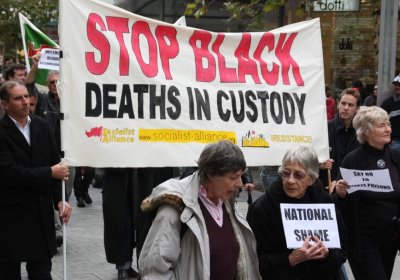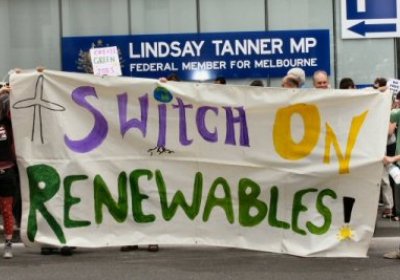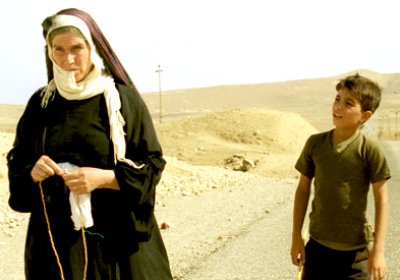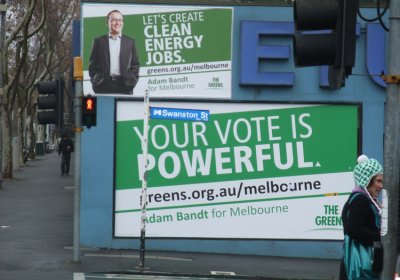No one won the so-called Leaders’ Debate on July 27 — not even the “worms”. It was no debate at all, and showed that people and the environment will lose with either the ALP or the Coalition in government.
Coalition leader Tony Abbott hasn’t convincingly shed his climate change denialism and his promise that Work Choices is “dead, buried and cremated” is even less credible.
Prime Minister Julia Gillard presided over Work Choices-lite and shares with Abbott an irresponsible determination to avoid serious action on climate change.
Australia
The family of Aboriginal elder Mr Ward, who died in the back of a prison transfer van in January 2008, will receive $3.2 million from the WA government. It is in addition to the $200,000 interim payment previously given to the Ward family.
The payment comes in the wake of escalating protests organised by the Deaths in Custody Watch Committee (DICWC) in support of the family. The most recent rally was a large march through the city on July 11 in the wake of the Director of Public Prosecutions’ (DPP) decision not to lay any charges in this case.
A prolonged industrial dispute is continuing at the University of New South Wales (UNSW) as a result of the ongoing refusal of vice-chancellor Fred Hilmer to bargain in good faith with the National Tertiary Education Union (NTEU) over staff concerns about pay and conditions — especially job security.
Hilmer’s intransigence should come as no surprise.
When Hilmer announced his decision to take up a tidy $750,000 annual salary package as vice-chancellor of University of New South Wales back in 2005, he said partial deregulation of education was like being “half pregnant”.
This federal election both Labor and the Coalition have failed to present any serious policies to address climate change. The Greens on the other hand have a plan to cut emissions, but does it go far enough?
The Coalition’s Tony Abbott rose to the leadership with the backing of a hardcore group of climate denier MPs. His “direct action” policy on climate change has two big problems: it’s not direct and it’s not much action.
The Melbourne International Film Festival (MIFF) apparently screened Iraqi film Son of Babylon against the wishes of the filmmakers — who object to the sponsorship of the MIFF by the apartheid state of Israel.
Israel faces an international boycott, divestment and sanctions campaign by opponents of its oppression of Palestinians. As with the international campaign against South African apartheid, this includes a call for a cultural boycott.
In New South Wales, 96.3% of rail workers have voted in favour of strike action to further their campaign for a new enterprise bargaining agreement. The combined unions campaign committee notified Railcorp this would take the form of a fare-free day involving station staff and transport officers.
Strikes at maintenance depots and workshops are planned at Hornsby, Flemington, Mortdale, Sydenham and Eveleigh for all Rail, Tram and Bus Union members on August 5 from 10am-2pm.
All RTBU office workers at Burwood and Granville will strike the same day from 11am-1pm.
The launch of the Nuclear Freeways Campaign took place outside federal resources minister Martin Ferguson’s office on July 30.
The launch was a send-off for a group of activists from Friends of the Earth who will travel the likely route nuclear waste will be transported from Sydney to a proposed nuclear waste dump at Muckaty station in the Northern Territory.
Victorian Electrical Trade Union (ETU) members have voted resoundingly to disaffiliate from the Australian Labor Party.
In a ballot of ETU members on whether the union should remain affiliated to the ALP, 85% voted against affiliation. Nearly 44% of ETU members voted in the ballot conducted by the Australian Electoral Commission.
This is the first time in many years a union has disaffiliated from the Labor Party, and possibly the first time a union has conducted a ballot of members on the issue.
Chasing the Lollyman
Presented by deBASE Productions
State Library of Queensland, Brisbane
“Move them along!”, referring to police strategies to deal with loitering Aboriginal people on Australia’s urban streets, was a phrase parodied to hilarity by Mark Sheppard during his acclaimed one-man show, Chasing the Lollyman, which ran at the State Library of Queensland during NAIDOC Week.
From June 30 to July 20, a group of Aboriginal rights and environment activists from New South Wales used a decommissioned red school bus to travel to Alice Springs.
The purpose was to expose government and media silence over the appalling conditions and treatment of Aboriginal people living under the NT intervention.
The passengers attended the Defending Indigenous Rights convergence in Alice Springs. They also visited town camps and remote communities to witness the effects of the intervention’s discriminatory measures such as income quarantining and compulsory land leases.
On July 15, 25 Justice Ride participants returned from their trip across Queensland to Alice Springs for the Defending Indigenous Rights convergence over July 6-9.
The trip to Alice Springs took four days each way, so there was plenty of time for us to get to know each other, discuss local Aboriginal rights campaigns, such as those against black deaths in custody, and take in Australia’s beautiful and ancient landscape.
- Previous page
- Page 862
- Next page








